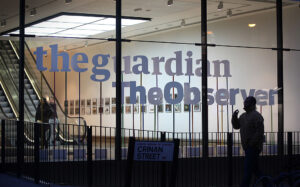The United Kingdom is a totalitarian hellscape. Freedom of speech has been all but abolished. Our police forces are now indistinguishable from the Gestapo. Criticism of the government will soon be illegal under imminent laws against thought crime. It will not be long before artists, political dissidents and other freethinkers will be rounded up and tossed into gulags…
Even with my love of melodrama, I cannot sustain such histrionics. While it’s enjoyable to momentarily inhabit the caricature of the Andrew Doyle that exists in the minds of my detractors, the truth is far less exciting. On a recent appearance on the Jordan B. Peterson podcast, I let it be known that I am leaving the United Kingdom to work with the actor and comedian Rob Schneider on a new production company called No Apologies Media. Some of my friends have assumed that I am flouncing away out of a desperate conviction that all is lost. The reality is a little more nuanced.
While I do not believe that we live under tyranny, there are serious threats to liberty that ought to be addressed. Many members of the ruling class have scant regard for freedom of speech, as evidenced by the existence of hate speech laws, the recording of “non-crime hate incidents”, draconian jail terms meted out for offensive social media posts and continued calls for online censorship. These are not the hallmarks of an authentically free country, but one in which the authoritarian instinct has not been successfully tamed. As for the artistic industries, they are now similarly beholden to an ideology that demands self-censorship and punishes nonconformity. For creatives, this means finding ways to work within a system that is antagonistic to genuine free expression.
We often hear practitioners in the arts claiming that “cancel culture is a myth” and that “nobody is being censored”. This is an easy claim to make if your views are naturally in lockstep with the prevailing orthodoxies of the time, but it does suggest a degree of solipsism. The energy it must take to studiously ignore the continual stream of reported cases of artists being cancelled would be sufficient to keep the Large Hadron Collider running indefinitely.
Like many of those with unfashionable views, I have been dragged unexpectedly into the culture war. Whereas I once made my living solely from writing plays, musicals and performing stand-up comedy, in recent years I have found myself drawn to punditry. I have hosted a weekly show called Free Speech Nation on GB News for the last three years, written numerous articles and two books in defence of liberal values, and satirised the worst excesses of culture warriors through my satirical character Titania McGrath.
But while I feel a compulsion to address the ongoing threats to free speech in our culture, and recognise the importance of challenging a journalistic monoculture, I do miss working in the creative field. It is my hope that relocating to Arizona to work with Rob will bring greater opportunities to focus on writing and producing comedy and drama. Rob’s commitment to freedom of speech is absolute and uncompromising. Under the aegis of his new company, I’ve already begun writing a sitcom with Graham Linehan and Martin Gourlay which we hope to be filming early next year. In addition, we have plans for other television projects with a focus on political and social commentary. This culture war isn’t over yet.
It’s quite the team. And it goes without saying that Graham is one of the foremost comedy writers of our times. If you ever find yourself in a conversation with someone who claims that cancel culture doesn’t exist, it might be worth asking how it is that the creator of hit sitcoms such as Father Ted and The IT Crowd has been unable to work in the UK television industry for six years simply for airing his opinions. You won’t get a coherent answer, but it’ll be entertaining to watch the attempt.
For myself, I’ve never been cancelled. One could even accuse me of finding a way to capitalise on my heterodox perspectives, given that much of my career has depended upon me expressing my views openly and satirising the intolerance of those who would rather I shut up. Yet isn’t it strange that a commitment to freedom of speech, individual autonomy, and equal rights to all irrespective of immutable characteristics, should be considered “heterodox” at all?
Rather than facing cancellation, I have experienced what Helen Dale has described as the “silo effect”. Although most of my political views would traditionally be described as “Left-wing”, my stance on the culture war has meant that I have been pigeonholed as being on the Right. So while I do not hold allegiance to any ideology, the insistence that I must be classified with one particular “side” means that my employment prospects will always be limited. The digital crèche of social media, with its insistence on political tribalism, binary thinking and purity spirals, has infected the mainstream. For many commentators, it’s now a matter of “you’re either with us or against us”.
The first time I became aware of an opportunity missed due to ideological factors was when a senior member of staff at the Soho Theatre in London told me candidly that I had been taken off the shortlist for a new playwriting scheme because I was white and male. Years later, when I taught stand-up courses at the Soho Theatre for up-and-coming comedians, I was informed that my contract could not be renewed because one of the members of the group felt “unsafe” after reading a joke I had tweeted. This impact for me was negligible — I didn’t rely on the work financially and was only continuing out of a sense of loyalty — but it did concern me that a leading theatre had such a casual disregard for the importance of artistic freedom.
A career in the creative arts should not be contingent on toeing any specific ideological line, but such incidents are now, unfortunately, the norm. The groupthink that currently predominates in theatre, film, television, comedy, publishing and all other branches of the arts has catalysed some promising pushback. The choreographer Rosie Kay and arts producer Denise Fahmy have established “Freedom in the Arts”, a project specifically aimed at tackling these restrictive conditions. One of their mission statements is “to protect freedom of expression and make sure that the arts are the place where difficult ideas can be addressed, explored and discussed”. What should be a prerequisite is now an ideal that we must struggle to reclaim.
In the current climate, artists are expected to be activists, to ensure that their work promotes the approved message. In other words, conformity is being demanded of those whose vocation ought to make them the most freethinking. When art is expected to be didactic and propagandistic, very little of interest will be produced. Rather than tailor their output to the whims of prissy moralists, artists should be aspiring to William Blake’s precept: “Create a System, or be enslav’d by another Man’s”.
That is not to say that creatives cannot fall in line with intersectional dogma if they so choose, but we have seen how the arts quickly become enervated when this is the default expectation. Widespread self-censorship is inevitable when commissions are conditional on whether they reinforce voguish political trends. This does not mean that there are not exceptionally talented artists currently producing good work, but it does mean that their output is often sanitised.
Of course, the true artistic geniuses — those who emerge once or twice in a generation — can always find a way to play the game. There’s a very good reason why Shakespeare’s masterful narrative poems Venus and Adonis and The Rape of Lucrece are preceded by dull and dispensable panegyrics to his patron Henry Wriothesley, Earl of Southampton. Michelangelo’s talents were so unquestionable that he was given licence to create explicitly erotic imagery for his frescoes in the Sistine Chapel. When the Papal Master of Ceremonies, Biagio da Cesena, complained that his nudes were more fitting for a bathhouse, Michelangelo painted the naked figure of Minos in the underworld with Biagio’s face, and for good measure added donkey’s ears and a snake biting his genitals.
We can’t all be Michelangelo. For us lesser mortals, we have to find a way to muddle along as best we can in an industry that expects us to be sheep to the establishment shepherds. I have no idea what my move to America will bring, but it is my hope to find a creative climate in which all this tribalistic nonsense is considered irrelevant. If nothing else, it’ll be an adventure.
Disclaimer
Some of the posts we share are controversial and we do not necessarily agree with them in the whole extend. Sometimes we agree with the content or part of it but we do not agree with the narration or language. Nevertheless we find them somehow interesting, valuable and/or informative or we share them, because we strongly believe in freedom of speech, free press and journalism. We strongly encourage you to have a critical approach to all the content, do your own research and analysis to build your own opinion.
We would be glad to have your feedback.
Source: UnHerd Read the original article here: https://unherd.com/




